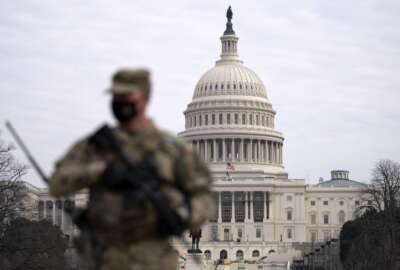Hubbard Radio Washington DC, LLC. All rights reserved. This website is not intended for users located within the European Economic Area.
Military sexual assault survivors storm Capitol Hill
Ahead of the markup of the annual defense policy bill by key House committee, hundreds of survivors of military sexual assault take to the Capitol to demand cha...
wfedstaff | April 17, 2015 3:44 pm
The day before a key House committee was set to mark up next year’s Defense authorization bill, hundreds of veterans who suffered through sexual assaults while they were in uniform made a trip to Capitol Hill Tuesday, demanding, among other things, more prosecutions of perpetrators and better services for survivors.
Draft language in the huge annual Defense bill the House Armed Services Committee will begin work on this morning includes several provisions designed to improve the military’s prevention and response on sexual assault issues, including one that would require sexual assaults to be prosecuted by a special court martial panel overseen by an officer of the rank of at least captain or colonel.
But advocates for survivors and their allies on Capitol Hill say Congress needs to go much further.
“If you want to know who I am, I’m the pissed-off congressman from Iowa,” one such ally, Rep. Bruce Braley (D-Iowa) said as he began remarks to a half-day summit organized by the Service Women’s Action Network (SWAN) Tuesday morning.
Angry, Braley said, because while DoD officials proclaim that sexual assault is unacceptable, there were still nearly 3,200 cases in the military last year; about 1 percent more than in 2010. He said DoD’s leadership needs to be as angry about the issue as he is, and as survivors are.
“Because when they have the audacity to talk about a zero-tolerance policy toward sexual harassment and violence in the military when they aren’t even close to being there, I want other people to be outraged about this problem,” he said. “The time for polite conversations is over.”
Plenty of outrage to go around
SWAN organized the summit of about 200 attendees from around the country ahead of one-on-one meetings later in the to discuss military sexual violence with their members of Congress. And in the morning session, there was plenty of outrage to go around.
Outrage at the stories they heard from fellow survivors: A female soldier who said she was raped, later put on a train to get an abortion, and ordered to return to work the same day. A male sailor who was raped by a shipmate, forced to return to sea with the perpetrator, then falsely diagnosed with a personality disorder and discharged from the Navy a year later.
And outrage at the difficulty of getting care or disability benefits from the Department of Veterans Affairs for post-traumatic stress disorder.
When it comes to the overall category of veterans’ benefit claims for PTSD, VA approves approximately 53 percent of all claims it receives, but when one looks at the subset of claims for PTSD that originated from military sexual trauma, the figure drops to 32 percent, said Michael Wishnie, who specializes in veterans law at Yale University and serves as director of the school’s legal services organization.
That’s because under current rules, PTSD resulting from sexual trauma is very difficult to prove, he said.
“The VA says it will accept all kinds of things as proof that a rape or sexual assault occurred, such as reports to law enforcement or rape kits, but as everyone here knows, most of that evidence is unavailable. The willingness of the VA to accept that evidence is welcome, but utterly inadequate. VA says maybe you could have made a report and there should be some paperwork in your chain of command,” he said to dour chuckles from the audience. “I think not much needs to be said about the fact that requiring that reports be made through the chain of command is also wholly inadequate to the reality in the field. That’s false hope.”
Spotty record of documenting, prosecuting cases
In March, eight women filed suit against the Department of Defense, some of them alleging that they were threatened, harassed and discouraged by their commanders from lodging complaints. One said she was told she simply needed to toughen up, and that “this happens all the time,” according to the lawsuit. Attendees at Tuesday’s summit gave similar accounts.
Defense Secretary Leon Panetta himself acknowledged the spotty record of local commanders properly documenting and prosecuting sexual assault cases last month when he announced DoD would begin requiring all sexual assault cases to be handled by a special court martial.
“At the local unit level, sometimes these matters are put aside and not followed up with,” he told a Capitol Hill news conference. “This requires that anytime a complaint is received, it’s referred up the chain of command for action.”
Panetta also said DoD would improve its document retention practices so that sexual trauma survivors can prove their cases to VA. But he said he wants to make several other changes, such as creating a special victims unit in each of the military services and letting guard and reserve members stay on active duty after they file a complaint so that their cases aren’t dropped will take action from Congress.
Victim advocates say those and other changes to the military criminal justice system are sorely needed, but there are other factors that are out of DoD’s control, such as the fact that unlike in the civilian world, victims in military courts can’t get monetary restitution even when their attackers are convicted.
When it comes to civil courts, they have no virtually no recourse at all, said Sandra Park, an attorney at the American Civil Liberties Union’s Women’s Rights Project. She said because of various court decisions, military members are barred from exercising discrimination and equal employment opportunity protections that apply to almost everyone else in the country.
“It’s very shocking to me that a law like Title XII can apply to civilian employees of DoD, and they may be doing very similar jobs as a uniformed member, but yet they have a total different avenue of legal relief,” she said. “[Civil actions] are about the notion that we need to be able to hold our institutions accountable with the victim in control of the process. You can imagine a scenario, possibly, where the criminal justice system is doing a great job of punishing perpetrators, but there’s still policies and practices that are allowing violence to continue to occur. It’s not enough just to be able to punish individual perpetrators. Looking at how these civil remedies can be used to reform the actual institution is really an important thing.”
Several survivors at the summit expressed anger at the fact so few perpetrators of sexual assaults are actually prosecuted. According to DoD’s most recent report on sexual violence in the military, officials received 3,192 sexual assault reports in fiscal 2011. But only 1,518 of those reports led to referrals for possible disciplinary action, and only 191 military members were convicted at courts-martial.
Sex crimes vastly under-reported
DoD also acknowledged that, as in the civilian world, sex crimes are vastly under-reported, according to Maj. Gen. Mary Kay Hertog, the director of DoD’s sexual assault prevention and response office.
“For every report of sexual assault, you can be guaranteed that there’s probably five to six times more victims out there that will never come forward to report because of many different reasons,” she said in a recent interview with the Pentagon Channel. “Men and women will not come forward for the very same reasons. There’s still a great stigma attached to sexual assault. They fear reprisal and retaliation or that their commander might not take them seriously.”
Hertog said the Pentagon is working to send the message to local unit commanders that sexual assault reports can’t be swept under the rug. Commanders who ignore reports should face severe consequences, she said.
“If they’re not taking it seriously, they should have their asses relieved of command,” Hertog told an Army conference on sexual assault Monday, according to the military newspaper Stars and Stripes.
But even when commanders do know about a sexual assault, survivors say, perpetrators frequently escape punishment. Too often, victims say, assailants are given the option to accept a discharge from the military with few consequences in their civilian lives.
“One thing I want to know is why they are not treated the way they’d be treated in the civilian system. These people are being discharged into the public to go out and harass and do whatever they might do because the military does not want to deal with these people. Why are they not put on a sex offender list? Why are they not treated like perpetrators in the civilian world?” asked one attendee who said his wife was a victim of military sexual assault.
“My next question is, when am I going to see a commercial on television with somebody standing up and saying rape in the military is unacceptable, just like Don’t Ask Don’t Tell?” he said to raucous applause from the audience. “How are we going to police the world if we can’t police our own military people?”
The Pentagon has in fact started producing those commercials on outlets intended for military servicemembers as part of a seven step strategy Panetta outlined last month to eliminate sexual assault in the military.
It’s a promise DoD has been making for years, but as even the chairman of the joint chiefs of staff acknowledged recently, so far, it’s failed.
RELATED STORIES:
Military sexual assaults rose one percent in 2011
8 women allege rape, harassment in military suit
Panetta calls for new steps to stop military sexual assault
Pentagon takes new steps against sexual assaults
Copyright © 2024 Federal News Network. All rights reserved. This website is not intended for users located within the European Economic Area.
Jared Serbu
Jared Serbu is deputy editor of Federal News Network and reports on the Defense Department’s contracting, legislative, workforce and IT issues.
Follow @jserbuWFED





